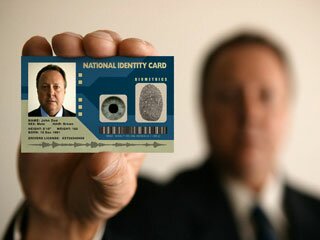REAL ID Alert: New National ID Law Takes Effect in 2013
December 27th, 2012In the United States, citizens have historically viewed identification as a state-level function. As a result, national identification cards have always been a source of political controversy. When the Social Security Act first passed, Social Security cards were optional and bore a disclaimer indicating that they could not be used for identification. Fast forward decades later, and they are routinely used as identification by governments and employers. Social Security cards are hardly optional anymore — try working without joining the program.
In 2005, President Bush signed the REAL ID Act into law. This bill created a national standard and database for identification of citizens, a role traditionally held by the states through driver’s licensing programs. It compels the states to spend lots of taxpayer money, and even creates a database of driving and criminal records which will be made available to the governments of Mexico and Canada. However, the bill has been difficult to enforce due to resistance from state governments. In 2013, the REAL ID Act takes effect, and, according to the law, states have six months to get their licensing programs synced up with federal requirements. Citizens must have one by 2014 in order to do federally-regulated activities like boarding airplanes. “Papers, please” is about to become official federal policy.
States Dislike Expensive Mandates
Luckily, many US states are still resisting the REAL ID Act. With budgets tightening, state legislatures are being forced to cut services, in some cases firing teachers or reducing pay for government workers. In a time like this, it is difficult to convince state lawmakers to carve out funds to change their driver’s license programs. Most people are satisfied with the way identification cards work currently, so this mandated spending by states includes little added-value for the taxpayer.
So far, only thirteen states are set to comply with the law in time. This could lead to a last-minute extension for other states. Enforcement has already been delayed several times for that very reason.
Data Retention and RFID
There are some truly frightening aspects to the REAL ID. One is the fact that there will be new federal information databases. Some will concern driving records, and those will be made available to foreign countries. Department of Homeland Security is implementing the program and thus will have unconstitutional access to information-sharing databases pursuant to the REAL ID Act.
RFID chips also might be used in REAL ID compliant cards. This is a serious concern to many, as RFID chips are easily accessed by hackers using over-the-air technology. If sensitive, personal information is to be stored digitally on the cards, then identity thieves will have a field day. Using wireless tech, they could perform a personal data dragnet on anyone carrying RFID-enabled REAL ID in their local area.
While it’s still possible for states and elected officials to fight back against the program, as it stands, states are required to get with it by January 15th, 2013, and citizens are going to be expected to have REAL ID to do activities like boarding planes by December 1st, 2014.
Visit http://www.SilverCircleMovie.com to learn more about our upcoming 3D animated film. Also, the Silver Circle graphic novel is available now at the following hyperlinks in full color and black and white.


